All Beans Are Nutritious, But Black Beans Are Exceptionally Healthy
Registered dietitians list all the impressive health benefits of black beans—plus easy ways to eat more of them.
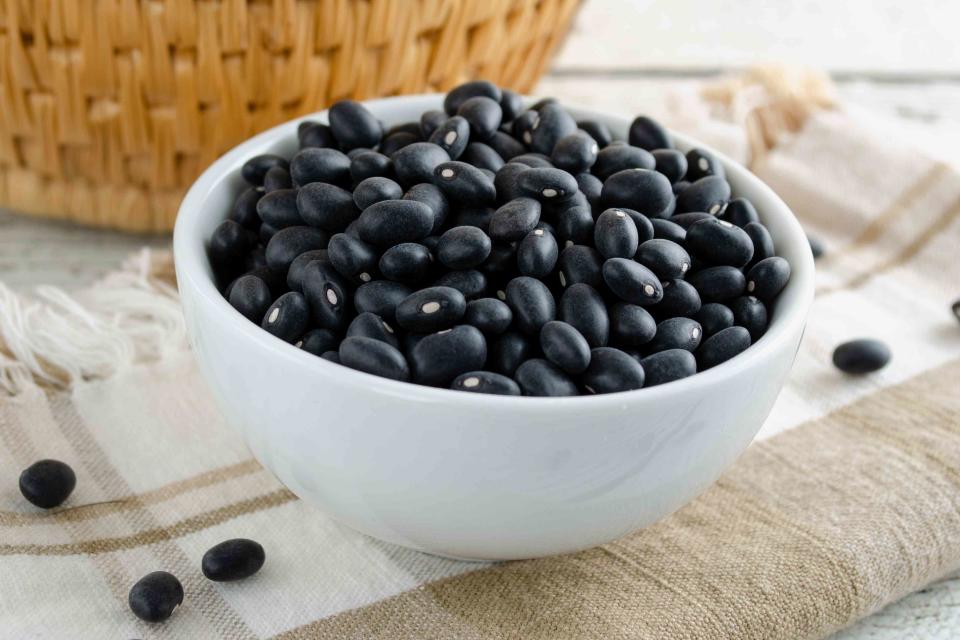
Linda Hall/Getty Images
A classic addition to Latin-inspired dishes, black beans are not only packed with flavor, but also super nutritious. Black beans' culinary use dates back over 7,000 years as a staple food for those living in Central and South America. Fast forward to today, and their creamy texture paired with their nutty flavor of these legumes have earned them a spot on restaurant menus and dinner tables across the country. Black beans (both dried and canned) are a shelf-stable, nutrient-dense, and budget-friendly pantry staple that’s always worth stocking up on.
But it’s the nutrients found in black beans that provide several impressive health benefits and make them one of the healthiest types of beans you can eat. Here are the most noteworthy health benefits of black beans with insight from a nutrition expert.
Related:5 Delicious Recipes That Start With a Can of Beans
Health Benefits of Black Beans
Black beans are an excellent source of protein.
“Black beans are a stellar source of plant protein,” says Bianca Tamburello, RDN, a registered dietitian and marketing expert with FRESH Communications. With a whopping 15 grams per one cup, you won’t even miss the meat when enjoying a meal rich in these nutrient-dense beans. That said, black beans are not a complete protein, meaning they don’t contain all nine essential amino acids. This may very well be part of the reason why rice and beans are such an iconic culinary duo: When eaten together, they provide an extremely delicious and hearty serving of complete protein. Beyond keeping us satisfied, protein offers sustained energy throughout the day while also promoting growth and repair within our bodies, so it’s extremely important to eat enough of this macronutrient from high-protein foods throughout the day.
Related:7 Best Sources of Vegan Protein, According to Nutrition Experts
Black beans are a high-fiber, gut-healthy food.
When it comes to gut health, black beans deliver on many fronts. They’re rich in fiber, with 15 grams in just a single cup of cooked black beans. Considering that most Americans (in fact, nine out of 10) don’t meet their daily fiber needs, adding black beans into your diet is an easy way to help you reach the recommended 25 to 35 grams of fiber needed daily. Fiber helps us to maintain healthy digestion and regularity.
Black beans are especially high in a specific type of fiber called prebiotics that are essential for optimal gut health. Prebiotics are basically indigestible fibers that make it all the way to your gut microbiome, which is found in the colon, or large intestine. Once they arrive, they serve as food for our healthy gut bacteria, which are pivotal to the health of the entire microbiome. Gut microbiome health has been linked to the health of several body systems, from brain health, to immune health, to cardiovascular health, and beyond. And eating a gut-healthy diet is one of the best ways to keep it in optimal shape.
Related:These 5 Tasty Dinner Ideas Are Extra-Good for Your Gut
Black beans provide important B vitamins.
Black beans also offer a variety of B vitamins, especially folate and thiamin. All B vitamins are key to effective energy metabolism and cell growth, but each also has its own unique benefits. Folate helps with red blood cell formation, but is especially important for pregnant women to consume—it plays a key role in neural tube development for a growing baby. In fact, in the late 1990s, the US Food and Drug Administration (FDA) started requiring cereal manufacturers to add folic acid (i.e. folate) to breakfast cereals to ensure Americans got enough of this key nutrient. Meanwhile, thiamin helps to strengthen the immune system and is vital for healthy carbohydrate metabolism.
Black beans help to manage blood sugars.
There are so many nutrients found in black beans that help the body regulate blood sugars in a natural way. The fiber and protein that black beans contain slow digestion, and thus slow the blood sugar response, helping you to avoid unwanted sugar spikes after eating. One study published in Nutrients found just this, with participants exhibiting a favorable glycemic response—a.k.a lower blood sugars—after eating a meal of black beans and rice, when compared to eating just rice alone. Another study found that adding black beans to a typical Western diet reduced insulin needs after eating in adults with metabolic syndrome. Yet another study found black beans to increase insulin sensitivity, reducing insulin resistance throughout the body. While this is great news for those with diabetes or other metabolic concerns, it’s also a win for everyone because this translates to sustained energy without the dreaded crash after meals.
Black beans are a source of resistant starch.
In black beans you’ll also find plenty of resistant starch. Resistant starch is a kind of carbohydrate that, unlike other starches, is not broken down in the small intestine. This means it won’t raise blood sugars, furthering black beans’ blood sugar regulation powers. Plus, resistant starch helps to feed our healthy gut bacteria, maintain gut regularity, increase fullness, reduce cholesterol, and has even been tied to reduced colon cancer risk. It also ferments slowly in the large intestine which means it produces less gas than other kinds of fiber (score!).
Black beans contain minerals that support bone health.
These creamy little beans are also chock full of minerals such as manganese, magnesium, iron, and phosphorus. While mainstream messaging gives calcium all the credit for promoting bone health, all four of these minerals are so important in maintaining healthy bones through a variety of different pathways. They’ll also help to promote growth and repair of other tissues in the body including nerves, muscles, and blood cells.
Black beans can help boost immune system health.
You can count on plant-based foods to offer a variety of healthy plant compounds, black beans included. In fact, you can find anthocyanins, kaempferol, and ferulic acid (among many other phenolic compounds) in these amazing beans. While these terms may not mean much to you, these bioactive compounds all act as powerful antioxidants in the body, helping to reduce inflammation, fight harmful bacteria, and prevent chronic illness. In fact, one study in Nutrition and Cancer found that legume consumption, including black beans, was associated with reduced risk of developing breast cancer.
Related:Pulses Are the Protein-Packed Staple Your Pantry Needs—Here's Why
Black beans can help prevent heart disease.
Beans, especially black beans, also deliver when it comes to protecting heart health. “Both the antioxidants and fiber in black beans support heart health by helping to decrease cholesterol and blood pressure levels,” Tamburello explains. The soluble fiber that black beans contain is mainly responsible for the cholesterol-reducing power of these legumes. This translates to decreased risk for atherosclerosis (or clogging of the arteries), and thus overall reduced risk for heart disease. One randomized control trial completed in 2021 found that black beans also had a positive effect on the tensile effects of blood vessels throughout the body, promoting vasodilation, or opening of the blood vessels. This translates to improved blood pressure regulation, another key factor to the prevention of heart disease.
Do black beans cause gas and bloating?
There are so many delicious ways to enjoy black beans but before getting into that, we should really address the elephant in the room: Will eating black beans cause you gas? “If your current diet is low in fiber, eating large amounts of black beans at once may be harsh on your stomach,” Tamburello says. This harshness may manifest as gas or bloating.
The best way to mitigate these possible side effects: “Simply add black beans to your diet slowly in small amounts,” she says. And don’t forget to drink lots of water when adding more high-fiber foods like beans into your diet.
Canned vs. Dried Black Beans
Another common question is whether you should spring for canned or dried black beans and the answer is, it depends. Both options will provide the same health benefits.
If you need to whip up quick and easy meals, canned black beans can certainly be your friend—but the one caveat is that certain brands of banned black beans contain higher levels of sodium. Thankfully, there are many low sodium varieties available, and giving your canned beans a good rinse before use can help wash away some of that added salt.
Dried beans will definitely be cheaper, last even longer in your pantry, and won’t contain any additional salt. Plus, when you prepare them at home you can control how far you want to take them while cooking, preventing the mushy texture that you’ll sometimes find in canned varieties.
Related:10 Wholesome (and Easy) High-Fiber Meals
How to Eat More Black Beans
With those concerns out of the way, here are some delicious, simple ways to add black beans to your daily routine:
Top your salad with these delicious legumes.
Find your favorite brand of black bean burgers in the frozen section or make them at home for a lower sodium option with fewer additives.
Let black beans shine as the protein in classic Mexican dishes like enchiladas, burritos, burrito bowls, quesadillas, nachos, and of course, black beans and rice.
Black bean salad with corn, tomato, lime, and cilantro is the perfect scoopable snack, meal topper, or side dish.
Wow your loved ones with a delicious black bean chili at your next get togethering.
Black bean dip or salsa makes the perfect appetizer or savory afternoon pick-me-up.
Easy Black Bean Recipes
Big-Batch Black Beans
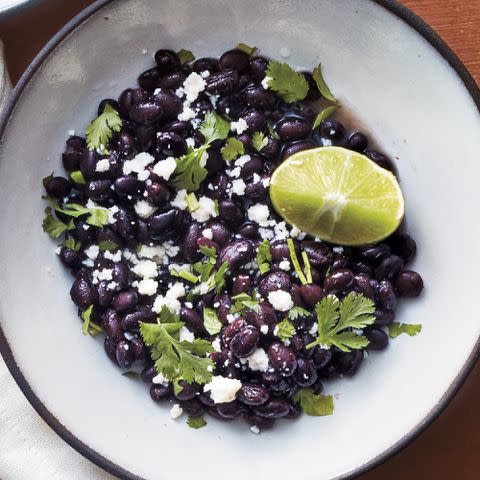
Mole-Spiced Black Bean and Quinoa Bowl
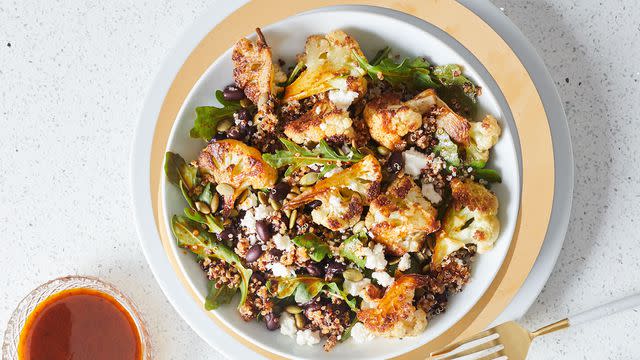
Green Chile Enchiladas
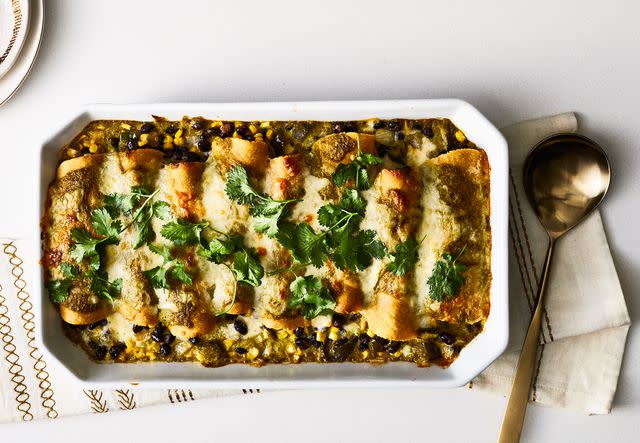
Black Bean-Oat Burger
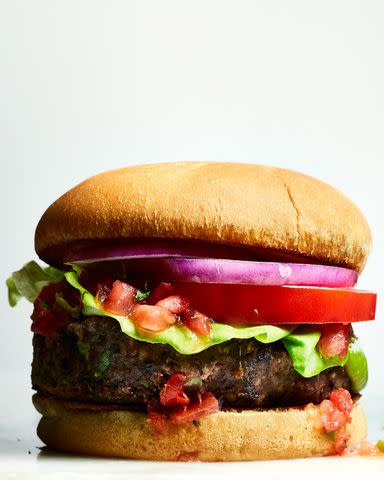
Roasted Sweet Potatoes With Chipotle-Black Bean Chili

For more Real Simple news, make sure to sign up for our newsletter!
Read the original article on Real Simple.

